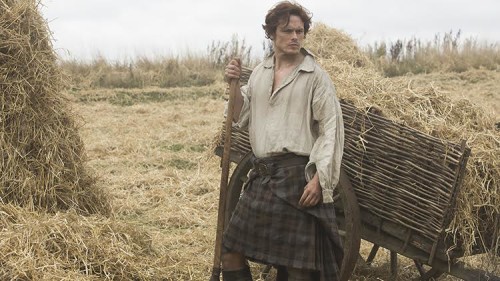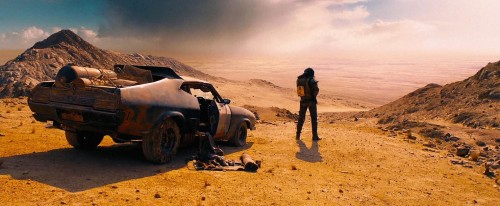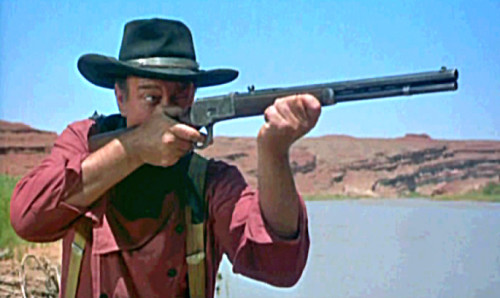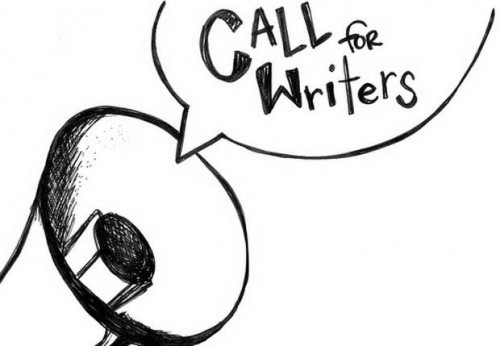This guest post by Carly Lane appears as part of our theme week on Masculinity.
Jamie Fraser, of the Outlander series (and subsequent television adaptation), is the quintessential romance hero. Mention his name to any fan of Diana Gabaldon’s works and you will likely hear a swoon in reply. When it comes to romantic traits, Jamie’s got them in spades. He’s a Highland warrior, a well-educated man, and he’s good with horses – not to mention easy on the eyes.
His role in the series, however – first as Claire Randall’s love interest, then as her hastily wedded husband – is anything but predictable, and it’s in looking at his story in the first book (and first season, respectively) that we realize just how multifaceted this masculine hero truly is.
When we’re first introduced to Jamie in the year 1743, he’s actually something of a damsel-in-distress; due to a dislocated shoulder suffered in the heat of battle, he cannot ride a horse without intense pain. Although Claire has been recently rattled by her time travel through the stones from the 1940s, her medical training won’t allow her to sit by and watch while his fellow Highlanders attempt to set his arm incorrectly. She takes it upon herself to put his shoulder back in place – and then to tend to him later through various gunshot and stab wounds. It’s interesting to watch the dynamic between the two characters in their first interactions together. Claire is familiar with taking charge in a situation after serving as a nurse in the Second World War, but Jamie doesn’t allow his masculine pride to get in the way of letting her help him. (Then again, given Claire’s headstrong nature, he likely doesn’t have much of a choice either way.)

The more we learn about Jamie, the more we come to see him as the epitome of a manly man. He volunteers to take a public beating instead of a lashing for a girl accused of loose behavior, and we see him smiling even after getting punched in the face. We’re witness to his participation in a very violent game of shinty against fellow clansmen, tackling other players into the mud. He’s survived through two severe whippings at the hands of Black Jack Randall, a captain of the British army, which left him with serious scars on his back. And when he relays his past as a fugitive to Claire in private conversation, we find out that he’s had to do some pretty hairy things in order to stay alive – like eat grass, for example.
But what’s most surprising about Jamie is that he encapsulates both the (fairly) innocent virgin and the male warrior in tandem, something that has almost been unheard of in fiction. After he and Claire learn that they will need to get married in order to ensure Claire’s protection from Black Jack, she confesses that she’s not exactly a virgin due to her first marriage. “Does that bother you?” she asks. “No,” he answers, “so long as it doesna bother you that I am.”
It’s a surprising twist on the trope. Jamie is undoubtedly a force of man to be reckoned with, though the fact that he is a virgin and thus relatively inexperienced in terms of sex when he encounters Claire – the older, more experienced woman – attributes some unexpected “feminine” qualities to his character. In the wedding episode, there are several scenes dedicated to his sexual education. His comprehension of the act in itself is completely transformed – he admits to Claire that, up until that night, he had believed it was something done with the man behind the woman, “like horses.” He does make a point of reminding Claire after a particularly heated first kiss, however, that while he may be a virgin it doesn’t mean he’s been a monk.
But he is a fast learner and a conscientious partner – he listens to Claire when she tells him he’s crushing her with his weight, and he’s careful to ensure he hasn’t hurt her when she experiences an orgasm the second time they have sex, inquiring if it happens every time for a woman. That thoughtfulness and willingness to reshape his worldview is not something that often goes hand-in-hand with an uber-manly man.

That worldview is also challenged again when Claire runs away, endangering the clan in the process, and Jamie is expected to beat her as a disciplinary act according to tradition. In the beginning, he can’t grasp why Claire is angry with him for doing so – but later agrees that adhering to a custom is not always the best course of action. After a particularly intense interlude on the bedroom floor (during which Claire holds Jamie’s dirk to his throat in the throes of passion and makes him swear he won’t beat her again), Jamie understands that what may be the conventional response to something in the 18th century isn’t necessarily the right thing to do.
Jamie is not the first character to experience sexual assault in Outlander, but he is the first male character. When he is captured by British soldiers, his masculinity and how he views himself as a man are completely fractured after his traumatic assault at the hands of Black Jack Randall in Wentworth Prison. His entire sense of identity is shattered in those harrowing hours where he faces abuse after abuse, and through his recounting of the events to Claire the audience is privy to every agonizing moment. Not only is he subjected to physical violence that permanently impacts the full use of his hand, he is emotionally manipulated by Black Jack into forced climax, his body unable to stop what his mind is straining to resist.
It’s no wonder Jamie feels less than a man when he is finally rescued from Wentworth. The damage that has been done to not only body but mind causes him to pull away from Claire and any sense of shared intimacy between them. He admits that he can’t even think of returning to his wife’s bed when any attempt at sex would make him feel sick to his stomach.
Through Claire’s love, support and assertion of his masculinity, as well as his willingness to share about his experience, Jamie is finally able to begin to reclaim his sense of self – and the first season ends on a note of hope, as the two sail away from Scotland together. It is rare that a series portrays a leading male protagonist – especially the undisputed romantic hero of the story – as a survivor of rape and sexual trauma, and how he will be healing from that harrowing experience as time goes on.
At first glance, Jamie Fraser might seem like just your average hero – but he’s a fascinating, layered character who doesn’t simply fall prey to the typical traits of masculinity. In true Highlander fashion, he defies them.
Recommended reading: “The Romance of Male Virginity in Outlander” by Laura Stanley @ Chew
Carly Lane is a writer based in New York City who specializes in obscure pop culture references and miscellaneous geekery. Her work has been featured on HelloGiggles, The Mary Sue, Femsplain and more. You can find her on Twitter at @equivocarly.













